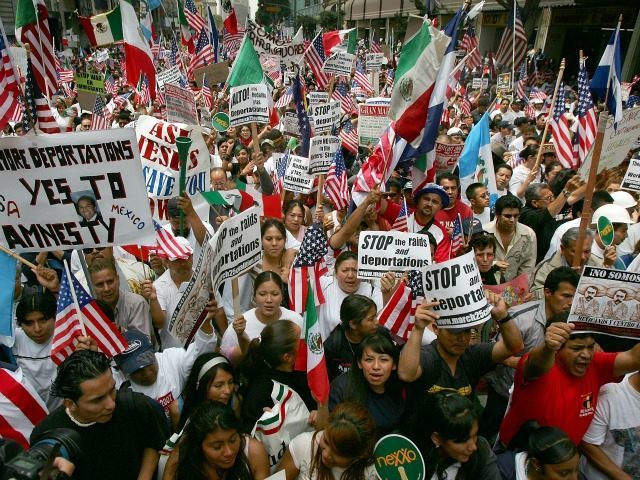A plurality of voters in California—including a majority of black voters—and nationally believe that the growing number of immigrants in their area is making their family’s financial situation more difficult.
A recent USC Dornsife/Los Angeles Times poll asked respondents, “Thinking about your and your family’s financial situation, do you think each of the following are making things easier, harder, or are not making much of a difference?: Growing number of immigrants in your area.”
Just 18% of California voters said immigrants were making their financial situation “easier,” while 41% responded “harder.” Another 39% said immigrants were “not making much of a difference” and 3% did not answer. Nationally, 43% said immigrants were making their financial situation “harder” compared to 10% who said they were making their financial situation “easier.” Another 44% believed immigrants were “not making much of a difference” and 3% did not provide an answer.
A plurality of whites (44%) and a majority of blacks (51%) in California felt that immigrants were making their financial situations more difficult.
Recently, Slate’s Jamelle Bouie, in responding to Donald Trump’s immigration plan that specifically mentions how black workers are particularly harmed by uncurbed levels of immigration, said that it was “not a bad play” for Trump and Republicans to court black voters with the immigration issue because “the easiest path for Republicans to take back the White House” is by “winning back some of the African-Americans they’ve lost since Bush ran in 2004.”
“And part of doing that, part of approaching that, might just be harnessing anxiety about immigration, about the fact that immigrants are typically filling low wage jobs, and are in some cases… competing with African-American workers,” Bouie continued, as Breitbart News reported. “Trump, I think, might be banking on that fact. And it’s not a bad play as far as strategy goes.”
More Hispanics (37%) in California believed that the growing number of immigrants was making their financial situation harder rather than easier (21%). More Asians believed that immigrants were making their financial situation easier (32%) than harder (28%). A near-majority of “other” minorities (49%) also believed that immigrants were making their financial situation harder than easier (11%).
A plurality of registered voters in Los Angeles County (42%), Orange County/San Diego (46%), Central Valley (42%), and the Inland Empire (56%) felt that the growing number of immigrants was making their financial situation “harder.” In the Bay Area, where Silicon Valley executives yearn for massive increases in foreign guest-workers and H-1B visas, 50% felt immigrants “are not making much of a difference,” 29% thought they were making their financial situation harder, and 19% answered “easier.”
The poll also found that “residents in the booming Bay Area were much more positive about the California economy than those in other regions”:
More than half of voters (52 percent) said they were satisfied with the overall economic situation, followed by 45 percent of voters in Los Angeles County, the poll showed. Residents elsewhere had a much more pessimistic view: Just 32 percent of voters in the Central Valley, 33 percent in Orange County/San Diego, and 21 percent in the Inland Empire reported feeling satisfied with the state’s economic situation.
Sixty-three percent of California voters said they were “mainly worried” about the changes in the economy over the past few years while only 35% felt hopeful:
Inland Empire residents were most likely to feel worried about changes in the economy (75 percent), followed by the Central Valley (69 percent), Orange County/San Diego (65 percent), Los Angeles (62 percent), and the Bay Area (52 percent).
“Coastal and Inland California have become two increasingly different states – economically, culturally and philosophically,” said Dan Schnur, Director of USC’s Jesse M. Unruh Institute of Politics. “Californians who live in the eastern part of the state tend to have less education and lower incomes, so it’s no surprise that they are much less satisfied with the economy as well.”
The poll, which was conducted October 29-November 3, has a margin of error of +/- three percentage points for registered voters in California and +/- 2.5 percentage points for registered voters in the United States.

COMMENTS
Please let us know if you're having issues with commenting.